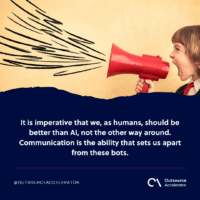Effective communication
A growing reliance on artificial intelligence (AI) in communication is a concerning trend that must be carefully monitored.
An increasing number of staff use AI apps to draft reports and papers. Some even use it to manufacture scripts for their quarterly presentations and then read them robotically to their bosses. Worse, some use AI proxies to attend meetings on their behalf.
While this method has saved time and streamlined processes, it has leapfrogged over the development of the necessary skills an employee must have. Communication is a fundamental skill that requires constant practice to master. AI is practically integrated into every software or application we use for work. It interrupts workflows with a slew of suggestions that ultimately obstruct the human thinking process. It has killed simplicity, spontaneity, and human independence.
In business, effective communication involves selecting the right words and crafting concise sentences that enable the audience to make informed decisions. It requires the presenter to be keenly aware of the audience’s needs and wants.
AI’s output, highly dependent on previous use cases, does not capture the nuance and uniqueness of every business situation. If not used conscientiously, it could lead to misinterpretations and communication failures, and worse, wrong business decisions.
Simplify and connect
It is imperative that we, as humans, should be better than AI, not the other way around. Communication is the ability that sets us apart from these bots. The skill entails critical thinking, the ability to connect ideas sometimes on the fly, and present them in the most coherent way possible.
Ideas must be easily digestible by anyone, free of jargon and technical concepts. Simplifying complex concepts and intricate matters into their simplest form is a necessary skill that every professional should strive to perfect.
AI lacks the creativity required in certain contexts. In critical business meetings, for example, presenters must be both respectful and firm in their arguments. They must be able to drive a point, but at the same time, maintain proper rapport with their audience.
How to be expert communicators
Fortunately, a welcome trend can help fill these growing communication skill gaps. More business leaders are promoting the importance of liberal arts education over technical courses.
DeepSeek CEO Liang Wenfeng admitted that he prefers humanities graduates over traditional tech degree holders, believing that diverse insights can lead to more holistic solutions. Recently, Standard Chartered CEO Bill Winters claimed his Wharton MBA was a waste of time, adding that his undergraduate degree — international relations and history — taught him “how to think.”
Liberal arts classes often feature debates, which train students’ verbal communication skills. They’re also required to turn in papers and reports, which train students how to marinate their thoughts to build an argument. These are critical steps in refining one’s communication skills and ensuring that, even amid the rapid advances in technology, humans remain superior to AI.
The question for your business
How does your business ensure that it communicates effectively?




 Independent
Independent





















